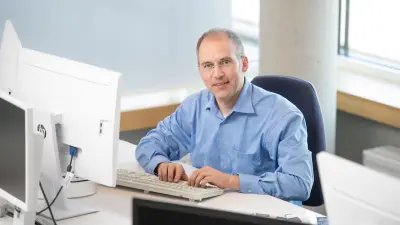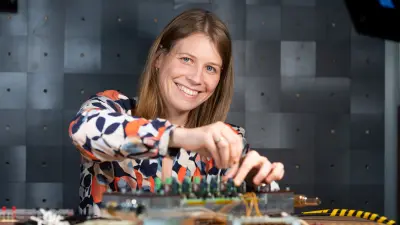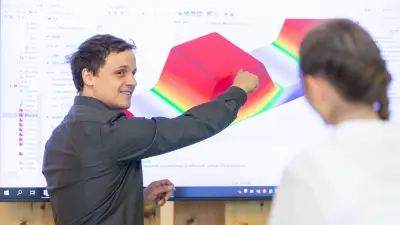Dr. Maxime Carré
Senior expert in stationary electrochemical systems and their control
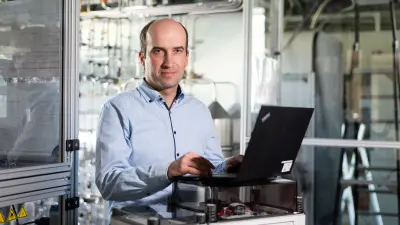
I completed a French/German mechanical engineering degree with a specialism in control theory. This background offers me a broad technical and scientifical understanding, which in my opinion is really crucial when it comes to electrochemical systems. I have been developing a stationary fuel cell system for 12 years, and more recently an electrolyzer system. As one of the research associates with the longest experience in this field, I like to describe myself as the “living encyclopedia” of stationary fuel cell systems. I am eager to continue this journey along the electrolyzer route.
Please tell us what fascinates you most about research.
In a research environment, you have to stay focused on one or two high-level objective(s) to obtain results, often over a long period of time. On the other hand, every day is different, because you tackle many different challenges on the journey to his high-level goal. This contrast makes the job very exciting! Another aspect that fascinates me is the pioneering spirit — being probably the first person to solve a problem is very motivating for me.
What makes research done at Bosch so special?
At Bosch Research, we develop products that make sense and improve the daily lives of millions of people in a sustainable way. For me, this is the main benefit of being part of the research at Bosch, and in my opinion probably the best motivator to achieve world-class results. On a more pragmatic note, I can say that the infrastructures, funding, and decision processes are top-notch, which allows us to concentrate on what really matters — cutting-edge scientific results.
What research topics are you currently working on at Bosch?
My team and I are developing new control algorithms to modulate the electrical output power of a stationary fuel cell system more and more quickly. In other words, we are “rebranding” the product as a dynamic fuel cell system. This requirement is essential when it comes to power‑critical loads such as factories and data centers.
More recently, I have started a new activity on a high-temperature electrolyzer. My main task is to understand this new product from both a technical point of view and an economic perspective, then go on to document and disseminate my understanding within Bosch.
What are the biggest scientific challenges in your field of research?
With regard to the fuel cell system, my biggest scientific challenge is understanding and putting all the physical effects and the correlations that occur within the system into simple equations. Although I have been doing this for almost 13 years, I keep discovering new effects. Putting this into equations makes it possible to develop robust and fast control algorithms. In the field of high-temperature electrolyzers, this is the same “game” but at much earlier stage.
How do the results of your research become part of solutions “Invented for life”?
Stationary fuel cells and electrolyzers are two unavoidable and essential products for a CO₂‑free society. Climate change is not just a discussion anymore. For me, this means each step in the development of these products at Bosch Research is automatically transformed into a step toward a more sustainable world, a step toward electrochemical systems “invented for a sustainable life”.
Curriculum vitae
Since 2011
Research engineer at Bosch for stationary electrochemical system
2008
Ph.D. at Bosch on the control of stationary solid oxide fuel cells
2006
Degree in technical cybernetics in Stuttgart
2005
Development aid project in South America
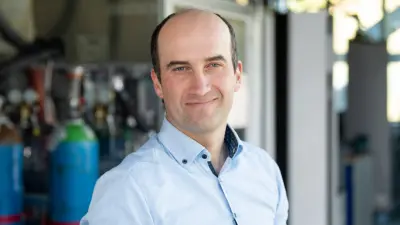
Selected publications

Bosch et al. (2017)
- Timo Bosch, Maxime Carré, Angelika Heinzel, Michael Steffen, François Lapicque
- Journal of Power Sources 371, 197 - 208

Wahl et al. (2015)
- Stefanie Wahl, Ana Gallet Segarra, Peter Horstmann, Maxime Carré, Wolfgang G Bessler, François Lapicque, K Andreas Friedrich
- Journal of Power Sources 279, 656 - 666

Carré et al. (2015)
- Maxime Carré, Ralf Brandenburger, Wolfgang Friede, François Lapicque, Uwe Limbeck, Pedro da Silva
- Journal of Power Sources 282, 498 - 510

Maxime Carré (2012)
- Der Andere Verlag
Get in touch with me
Dr. Maxime Carré
Senior expert in stationary electrochemical systems and their control

